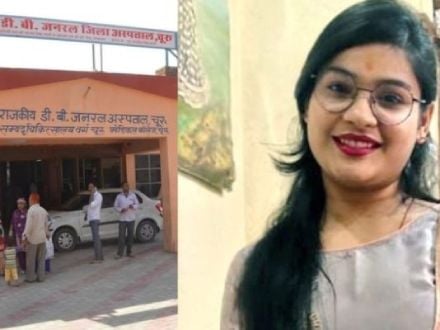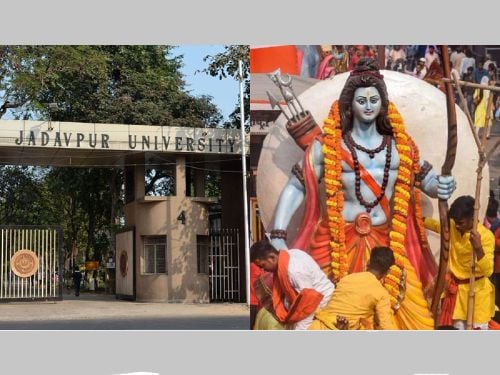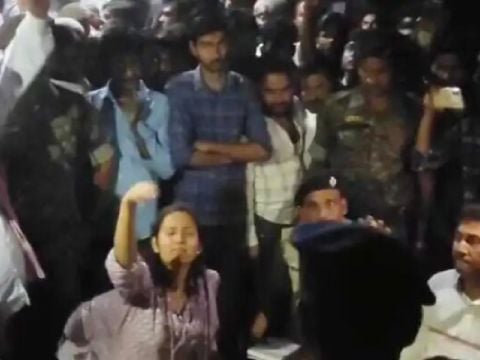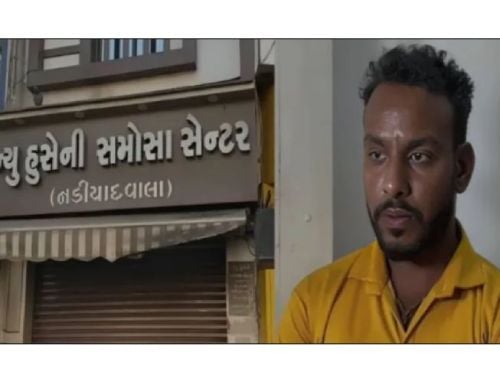
Reference: The program India Tonight on CNBC TV18
Participants: Mr. Karan Thapar (anchoring the program), National spokesperson of the Hindu Janajagruti Samiti Dr. Durgesh Shankar Samant, the founder & organizer of the All India Andhashraddha Nirmulan Samiti Mr. Shyam Manav & an Independent Lawyer Mr. Anand Grover.
Introduction: Hello & welcome to India Tonight! I am Karan Thapar. Maharashtra is voiced to pass a bill prohibiting black magic & evil practices; but could it end up banning SaiBaba, Harry Potter & Moharram? During the moment as we ask, does this bill go too far?
Questioning Religious Beliefs?
There is no doubt that the Indian people can be superstitious & sometimes can take their beliefs in supernatural powers or the occult to an incredible extreme. But the solution proposed by the Maharashtra Assembly could be worse than the problem itself. This is the Maharashtra Eradication of Black Magic & Evil Practices Bill. To begin with, its language is said to be vague & imprecise. It could include the Vedas, children stories & religious practices. Worse, the bill also empowers the vigilance officer to enter & search any premise, where, he thinks, black magic has occurred. So, is this bill a terrible mistake that needs to be stopped before it is enacted? With me is the National spokesperson of the Hindu Janajagruti Samiti Dr. Durgesh Samant, the founder & organizer of the All India Andhashraddha Nirmulan Samiti Mr. Shyam Manav & an Independent lawyer Mr. Anand Grover. Sadly, the Maharashtra Minister responsible for the bill declines to join.
Mr. Karan Thapar: Mr. Shyam Manav, before we discuss the contents of this
Bill & its implications, let me ask you a simple question. Why is this bill necessary?
Mr. Shyam Manav: First of all, I would like to say that I myself was a very superstitious person and had blind faith. I was manifested by a ghost and a mantrik had removed it from me. I was a devotee of many Babas and was afraid of practices such as mantra- tantra etc. While working as a journalist in the Kirloskar press at Pune, I realised that all my beliefs are false. Thereafter in 1982, I founded the Akhil Bharatiya Andhashraddha Nirmulan Samiti. For the past 23 years, I am working for this organization.
Mr. Karan Thapar interrupts and asks Mr. Shyam Manav to answer precisely.
Mr. Karan Thapar: Can you tell me again, why is this bill necessary?
Mr. Shyam Manav: In my experience of 23 years of service in the organization, we came across nearly 2500 persons who were so-called babas, godmen, mantriks and persons who claim that they are possessed by a Goddess and we have exposed all of them. We found that as per the existing law in Maharashtra, under some pretext or the other, these fake babas who cheat people, would escape and move freely in the society again. There is no specific law to hold them.
Opinion
Mr. Karan Thapar: I understand that what you want is a bill that specifically outlaws so called Godmen who exploit the people.
Durgesh Samant, your position? Is that, to the extent this bill seeks to cover & make criminal, acts of black magic or what are called evil practices, you believe that the Indian Penal Code already does that, and therefore the bill is
unnecessary! Is that right?
Dr. Durgesh Samant: Yes. Because many provisions & many so-called offences in this bill are covered by Indian Penal Code. Say for example, Under the pretext of expelling ghost, assaulting by tying a person with a rope (319) is hurt, (320) is grievous hurt, (336) is act endangering life & personal safety, etc.
EXPERTS SAY! (The definite positive answer shows that the existing laws are capable & a new Act is not at all necessary. We have no objection with people being punished for committing these crimes. But the present Indian Penal Code has clear provisions for the same. For current provisions, refer IPC Sections 319-326, 299, 302, 508, 117, 497, 417, etc.)
Mr. Karan Thapar (interrupts): So there are a whole range of Penal Code provisions that actually cover what the Bill is trying to do! You are saying that the Bill is unnecessary, all right?
Anand Grover, what do you think is the problem with the legislation in the area of black magic or religious practices or spiritual beliefs? Is that it’s all a matter at the end of the day for interpretation & therefore, it is a bit like walking across a minefield; what for one person is superstition, for another is belief & surely the government ought not to be intervening here at all.
Mr. Anand Grover: Well, I think there is a basis of you saying that; but there is also a rational basis to say that certain practices, which are known to be not really working and so called godmen are taking advantage of poor people; they need to be stopped. And there is a cognate or similar Act nationally called the Drug & Magic Remedies Act. Unfortunately, that Act doesn’t actually stop the practices, it only addresses advertisements.
Opinion – Mr. Karan Thapar: The problem is that, the Act doesn’t actually concern itself with black magic, it doesn’t concern itself with religious practices and spiritual belief. When I am talking about something that intrinsic to human faith, should the law be legislating? Give me an answer to
that!
Mr. Anand Grover says that, I think that the law can legislate provided we are very clear about what it is legislating. This law, unfortunately, in its definition has related a number of practices & unfortunately because of that it doesn’t understand what it is trying to stop. I think the Drug & Magic Remedies Act is good because it understands what it is trying to do & it limits itself. But I think the actual practice of doing jadu-tona or black magic needs to be stopped, if it’s irrational. I agree with you that there are certain spiritual practices, religious practices that cannot be stopped.
Mr. Karan Thapar (interrupts): Let’s not jump the whole discussion and assume that jadu-tona is always irrational; let’s come to that in due course) Let me first put this to Durgesh Samant. Do you believe that in terms of essential definition which are intrinsic to this bill, in fact, the bill is deficient i.e., terms like black magic, aghori, karni, bhanamati, jaran-maran; none of them are defined at all?
Dr. Samant: Many words are not defined clearly in this particular bill i.e., the new bill about what we are discussing; say for mantra-tantra, jaran-maran, so-called miracles, supernatural powers & so forth. In addition to that we, under the Act of Information, sought information from Maharashtra Police which explicitly & clearly says that the present law is sufficient to curb these practices.
Opinion – Mr. Karan Thapar: All right! You are saying first of all, the bill is imprecise, it doesn’t define what it is talking about & secondly, the police have confirmed your answer that in fact, the present law is sufficient.
Addressing Mr. Shyam Manav
Does the bill assume that black magic, tantra-mantra, jaran-maran are terms that firstly, everyone understands? & secondly, do you also feel that these terms are understood equally by everyone ?
Mr. Shyam Manav: This bill is difficult to be understood by a layman because it is quite an uncommon kind of a bill. The definitions in Section 2B of this bill states clearly that the meaning of black magic & aghori evil practices are those, which come under the purview of the 12 acts mentioned in the schedule.
Mr. Karan Thapar (interrupts & asserts that what Mr. Shyam Manav is saying is incorrect): The clause 2 of the bill made by you states that ‘The bill has the same meaning as assigned under the Drugs & Magic Remedies Act’. The Drugs & Magic Remedies Act does not talk about black magic, it doesn’t talk about jaran-maran, tantra mantra, aghori or karni. So in other words, when you say that refer to the Act’s definition, it is not helpful, there are no definitions there.
Mr. Shyam Manav: We have thought a lot while preparing this bill & wherever the meaning is not clearly stated, there the reference of the Drugs & Magic Remedies Act is to be considered
Mr. Karan Thapar: But if there are no meanings stated, then which meanings should be considered.
Once again Mr. Shyam Manav says that the meanings are stated there; but according to Mr. Karan Thapar’s opinion there are no meanings stated in clause 2B. Thereafter Mr. Shyam Manav says that, while preparing the bill the Supreme Court Judge has also shared his views.
Dr. Samant: Here let me give some concrete examples i.e., in this schedule, Clause no. 8 which says ‘to create panic in the minds of public, in general, by way of invoking ghost by mantra’ & ‘to invoke ghost putting up a false show to make a person free from poisonous infection invoking mantras & diverting him to practice aghori acts’.
Opinion – Mr. Karan Thapar (interrupts): Lets not get lost in definitions because, what you claim in the case is been disputed. Let’s take an example & lets see on the basis of that example who can solve this dispute. For instance, do you believe that under the terms of this bill, if it were in force, Saibaba & the act of producing ‘vibhuti’ would be construed to be promotion, propagation or the practice of black magic?
Dr. Samant: Yes. If Saibaba comes to Mumbai & performs something like this, he will be booked.
Mr. Karan Thapar: Let me bring in Mr. Manav & ask him.
(Addressing Mr. Manav) It’s been alleged, as an example to prove, that your definitions are misleading. That, if Saibaba came to Bombay, under the terms of this Act, he would be arrested for black magic.
Mr. Shyam Manav: Anyone doing such magic or miracles will be considered under this bill.
Mr. Karan Thapar (asks Mr. Manav to answer to the point): I am talking about Saibaba & the ‘vibhuti’.
Mr. Shyam Manav: Saibaba had declared around 2 years ago that he is not going to perform any such miracles. Therefore, there is no meaning in considering a specific name. However, when this Act comes into force, anyone in Maharashtra, performing any act falling under the purview of the 12 acts mentioned in the schedule, will be punishable.
Mr. Karan Thapar: If we assume that Saibaba comes to Bombay and makes ‘vibhuti’, then will Saibaba also come under this Act?
Mr. Shyam Manav: Yes. Saibaba will also be covered under this Act & the same holds good for anyone performing a similar act.
Mr. Karan Thapar (addressing Mr. Anand Grover): Would you accept that regardless of what individuals may think of Saibaba & about the act of producing ‘vibhuti’, any bill that seeks to criminalise Saibaba is surely unacceptable?
Mr. Anand Grover: Well, I think that if He wanted to deceive or defraud, which is the intention of this bill, though it is very imprecisely drafted, I think even Saibaba should be punishable. But that is not the point. I think the problem is not that.
Mr. Karan Thapar (interrupts): You added a very important point. You said, ‘if He were seen to be defrauding’, but suppose He is not? Suppose Saibaba comes & in the eyes of his believers….
Mr. Anand Grover: No, then there is no fraud.
Mr. Karan Thapar: But if it is an act…Yes, go ahead!
Mr. Anand Grover (addressing Mr. Karan Thapar): Can I answer that? I think if people are defrauding & deceiving; in the eyes of His followers, He is actually performing miracles & they believe that He is actually doing something miraculous & He may not be on the face of it defrauding them, I don’t think that there is any harm in it. Moment He starts curing diseases, tries to actually come into the field of medical treatment which actually causes harm, then He should be punishable.
Mr. Karan Thapar: You are ending your whole answer on ‘the moment He starts practising fraud’. Let’s pause a moment there & let me bring in Dr. Durgesh Samant.
(Addressing Dr. Samant) If not for Saibaba, that would in fact be covered, although as Anand Grover calls it that, there is an important position to bear in mind. You believe that in fact, even religious books like the AtharvaVeda, you believe that even religious practices like the Moharram, Ramzan, the practice of lent & fasting during lent, as well as the practice of penance & sufferings like the Christians…all of those must be covered by this bill. Am I right?
Dr. Durgesh Samant: Yes! As there is no definition of tantra in this (Act). There are so many books on Tantrashashtra in Buddhism, in Jainism & in Hinduism too. There are so many books which will all be covered under this (Act). Secondly, recently BBC has given news that Roman…
Mr. Karan Thapar (interrupts): All of tantrik worship as well could be covered under this!
Dr. Durgesh Samant: Everything will be covered!
Let’s pause & once again go back to Shyam Manav.
Mr. Karan Thapar: Shyam Manav, the AtharvaVeda consciously & deliberately talks about jadu-tona, mantra-tantra. Would that be covered by your bill? Would the selling & the propagation of AtharvaVeda be covered?
Shyam Manav: According to Section 3 of this Bill, it is punishable. The Bill specifically mentions, ‘acts done by a person’ which means that, after the bill comes into force, any living person performing such acts is punishable. Therefore, the incidents that have occurred, before the bill comes into force, will not fall under its purview.
Mr. Karan Thapar: If AtharvaVeda as alleged by Durgesh Samant or Moharram & Ramzan are not covered, then what about the practice of Reiki & Pranic Healing?
Mr. Shyam Manav: It is not covered.
Mr. Karan Thapar (questions Mr. Manav): How can it not be covered? Because you talk about any one who believes in aura & emanations from healers; that is precisely what Reiki has….
Mr. Shyam Manav: Where is it mentioned?
Mr. Karan Thapar: Section (25-2A)(The proper clause is 11-2A – Editor) of your schedule mentions it & asks Mr. Shyam Manav to read his schedule.
Mr. Karan Thapar (addressing Mr. Anand Grover): It seems to me that the essential problem, even though, people may dispute with individual examples, is that, this bill seeks to tackle & prohibit belief in supernatural powers & miracles. And I put it to you that both of those are intrinsic to religious worship. Therefore, whether the bill intends it or not, implicitly & sometimes explicitly, it trespasses on religious beliefs. That’s the problem with the bill! Would you agree?
Mr. Anand Grover: Yes. That’s what I was trying to say earlier. Though it is well intentioned, the practices which are sought to be prohibited are so imprecise, it trenches not only on religious practices & spiritual practices but as you pointed out, it is not 25-2A, it is no. 10 & 11 A of the Schedule, which is what you were referring, ‘To create an impression that oneself is having supernatural powers or emanations on another person or a holy spirit’. Now this actually specifically made an offence. Whereas under Section 13 of the Act, religious practices which do not cause harm are exempted. There is an intrinsic contradiction in the Act & the problem is that, the Act, according to me, is not workable. The police cannot implement it & it is going to be an abject failure & probably Mr. Manav who is very enthusiastic about it will have a rude shock after he finds out, that very few people are implementing the supporting Act.
Mr. Karan Thapar (compliments Mr. Anand Grover): You have given a very clear wording against the Act. I want to come back & talk very briefly, in the limited time we have, about the procedure for the enforcement. This Act makes a bad situation even worse. See you in a moment after a break.
Welcome back to India Tonight. Let’s discuss the proposed Maharashtra Black Magic & Evil Practices Act.
Mr. Karan Thapar: Durgesh Samant, let’s now turn to the procedure for enforcement. You believe that the bill, which appoints the vigilance officer who can enter any place at will, if he believes, that the act of black magic has been practiced there. You believe that this is a Draconian Power! Is that right?
Dr. Durgesh Samant: Yes, because the additional thing here is that the vigilance officer can act or is supposed to act not only to a particular crime committed but to prevent it also. So, under suspicion also, he can go on moving around & from a third party complaint. So, anybody sees something & he feels that something is wrong and informs the particular officer, the officer on his own can decide & with his own judgement can do whatever he wants.
Mr. Karan Thapar: So you are saying that, it is not only draconian but it is also intrusion of people’s privacy, under the garb of act!
Let me put it back to Anand Grover. This bill gives the vigilance officer the power to ‘detect’, which means it goes considerably beyond, because it requires him to fare it out, as per the happenings, which are considered to be criminal under this law. Now give us, that the police don’t go around detecting further any other form of crime; it only reacts when it’s happened. Don’t you think that this is going to be particularly intrusive?
Mr. Anand Grover: Yes, on the face of it the way it is drafted, it would allow the so-called vigilance officer to be more intrusive than he should be, under the normal law. But I can tell you very clearly; the police mindset is not going to change because of this law. So despite the fact, that it should be more intrusive according to this law, I don’t think the police will act like that.
Mr. Karan Thapar: You can’t excuse draconian legislation on the grounds that the police are inefficient & won’t enforce it. A draconian Act is a draconian Act, regardless of how the police enforce it!
Mr. Anand Grover: I am not supporting it. I am just professing it. At the same time, as I was going to mention, it is a draconian Act & secondly, more important, despite the label of vigilance officer, who is supposed to be a very
intelligent officer to implement this act, what is going to happen is, like in every other law, our regular police officers are going to implement this Act. So, I will tell you the regular police officer, even though he may have draconian powers, will not be able to understand & implement this Act. So I think, this is an Act, which is not implementable.
Mr. Karan Thapar: Let me bring in Mr. Manav because he’s actually now loaded the dice and should be all set and have a chance to reply.
(Addressing Mr. Manav) I put it to you Mr. Manav. In light of what you heard Mr. Samant say, ‘that it is draconian’, in the light of what you heard Mr. Grover say, ‘that it is liable to be misused, it is liable not even to be fully understood by the vigilance officer’, so this Act, in the light of both of those concerned, seems to resemble the pilgrim father laws & the early salient trials that were specifically designed to deal with witchcraft in the seventeenth century in America. You are pushing back India to a position 200 years old!
Mr. Shyam Manav: Sir, first of all, our Constitution has given us freedom of religion & of expressing our religious ideas. Likewise, it has also given the State, a right to frame laws if people are at loss. Secondly, no additional rights have been conferred upon the vigilance officer. The vigilance officer will have the same rights as are conferred upon the police by the Criminal Procedure Act, 1973. The need for a vigilance officer arises because this is a specialised subject and it is essential that its each & every concept is clearly understood and every case relating to this Act is completed and this responsibility is being given to the existing police officers.
Mr. Karan Thapar (interrupts): Recently, to overcome his loss of form, Sachin Tendulkar performed, what is called, the Sarpasanskar at the Kukke Subramanyam temple in Mangalore. Now this, as you know, is a ritual designed to overcome a curse incurred by an ancestor, who killed a snake & did not perform the neutralising ritual. Under your bill, would either Sachin or the priest of the temple be liable for action?
Mr. Shyam Manav: Only the 12 acts mentioned in the schedule are punishable. Excluding them, other spiritual practices, etc. are not included in the schedule.
Mr. Karan Thapar asks Mr. Shyam Manav to answer to the point.
Under the terms of your bill, will Sachin performing the Sarpasanskar be considered?
Mr. Shyam Manav: Neither Sachin nor the priest will be considered. No other religious acts are liable to be considered under this schedule.
Mr. Karan Thapar asks Dr. Durgesh Samant: You built your entire case on the belief that, this Act can not only be misused but that it directly infringes upon individual religious worship & faith. You are just been told that you are wrong about the AtharvaVeda, you are been told you are wrong about the example of Sachin Tendulkar, you are wrong about your concerns about Pranic healing & Reiki. Have you misunderstood the bill?
Dr. Durgesh Samant: Not at all. In the particular schedule, what they say, there is one particular fallacy, that they have not defined clearly what are so-called miracles, they have not defined Aghori Acts. In the Clause 8, they brand the offence as Aghori Acts but they have not defined. If Satya Saibaba comes & asks Sachin to perform this particular puja, Satya Saibaba has performed some miracles & he is asking to do some puja & then it becomes a display of miracles plus asking him something &…
Mr. Karan Thapar (interrupts): Let me bring in Anand Grover for the last word & I want to have to ask you to be very brief Mr. Grover. Do you accept, that regardless of the dispute that you heard between Durgesh Samant & Shyam Manav, one contradicting the other; that in fact, it is in the imprecision of the terminology & the fact that important terms are not defined at all, does the danger of this Act lies? As a result of which, the different vigilance officers can interpret it differently & given the power of vigilance officer, that becomes very dangerous. Would you accept that?
Mr. Anand Grover: Yes. I think on the face of it, it is a dangerous bill; because Mr. Manav, I think, should have been very clear about how to define the practices. It is too broad, there are too many vague expressions in the Act & the Schedule should not be a definition of series of 12 acts. It is not precise too.
(Addressing Mr. Anand Grover)
Answer in a word: Should this bill therefore be dropped or should it be passed by the Assembly?
Mr. Anand Grover: No. It should be reconsidered by Mr. Manav & I think it should have proper legal advice.
Conclusion: All Right Gentlemen! I am afraid; we are going to have to leave that particular decision there. It is clearly a bill that affects people’s life. It is a one way watch. It is a case where, with the noblest of intentions the Maharashtra Assembly could end up trespassing on our beliefs, on our privacy & our rights. This is a crucial situation that should be very careful watched! Thanks to my guest for joining me. Good Bye! Good Night!

 Rajasthan: Woman found hanging at a beauty parlour, Arshad, 3 others booked
Rajasthan: Woman found hanging at a beauty parlour, Arshad, 3 others booked Jadavpur Univ revokes permission to celebrate Ram Navami on campus after granting it
Jadavpur Univ revokes permission to celebrate Ram Navami on campus after granting it Andhra Pradesh: Farooq kills mentally challenged Hindu man for insurance money
Andhra Pradesh: Farooq kills mentally challenged Hindu man for insurance money Pakistan: Ancient Hindu temple in Khyber Pakhtunkhwa demolished for commercial complex
Pakistan: Ancient Hindu temple in Khyber Pakhtunkhwa demolished for commercial complex Bihar: Goddess Bhagavati Temple in Araria vandalised and deities damaged
Bihar: Goddess Bhagavati Temple in Araria vandalised and deities damaged Vadodara: Beef supplier Imran Qureshi arrested in beef-stuffed samosa case
Vadodara: Beef supplier Imran Qureshi arrested in beef-stuffed samosa case